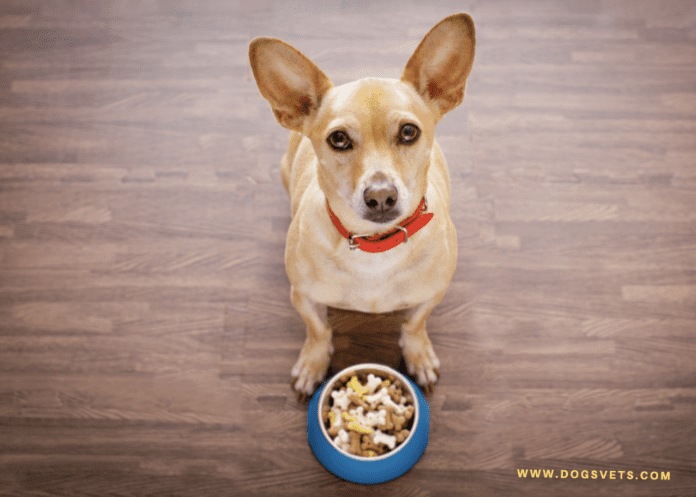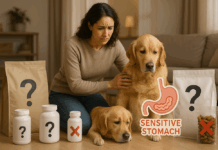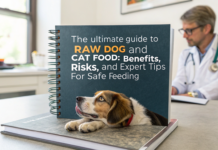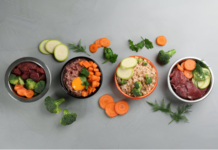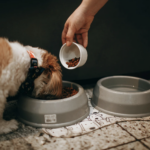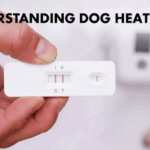Last Updated on October 7, 2024 by Dogs Vets
Human Foods That Can Be Harmful to Pets
Pets are beloved members of our families, and their health is a top priority. While it may be tempting to share our food with them, some human foods can be extremely harmful, even deadly.
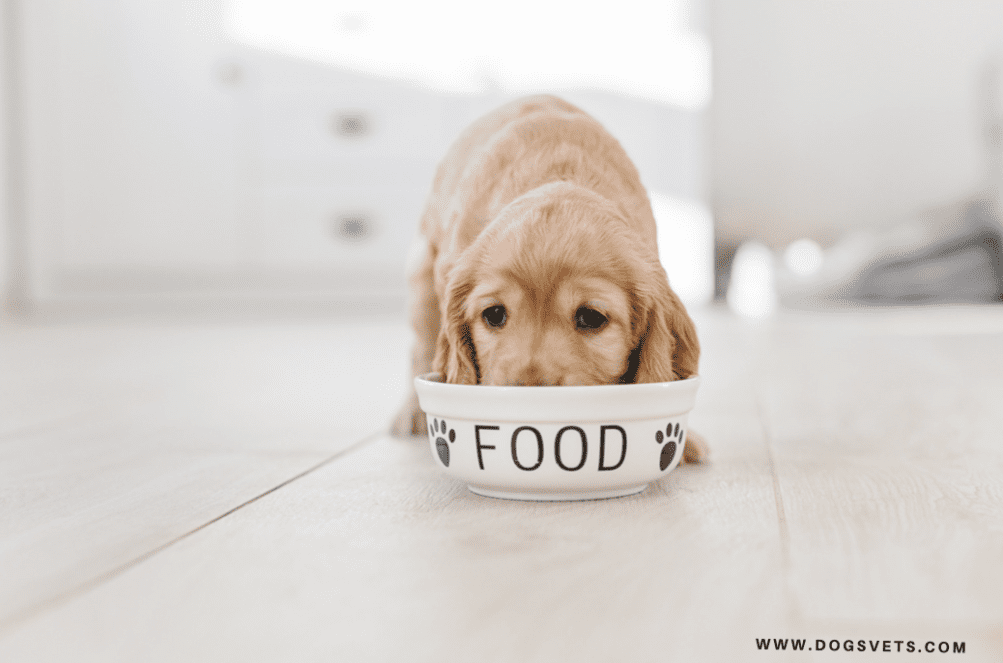
This article outlines several human foods that you should avoid giving to your pets, particularly dogs and cats.

Common Harmful Foods for Pets
1. Grapes and Raisins
- Risks: Can cause renal failure.
- Notes: The exact toxin is unknown, so it’s best to avoid them altogether.
2. Avocado
- Risks: Contains persin, which can cause vomiting and diarrhea in pets.
- Notes: While harmful mostly to birds and some mammals, it’s better to be cautious.
3. Chocolate, Caffeine, and Coffee
- Risks: Contain methylxanthines, which can lead to vomiting, diarrhea, hyperactivity, irregular heart rhythms, seizures, and even death.
- Notes: Dark chocolate is more dangerous than milk chocolate.
4. Onions, Garlic, and Chives
- Risks: Can damage red blood cells and cause anemia.
- Notes: Cats are particularly sensitive, but dogs are also at risk.
5. Macadamia Nuts
- Risks: Can cause weakness, depression, vomiting, and tremors.
- Notes: Symptoms can start within 12 hours and last for up to 48 hours.
6. Xylitol
- Risks: A sweetener found in sugar-free products that can lead to insulin release, resulting in hypoglycemia (low blood sugar) and liver failure.
- Symptoms: Vomiting, lethargy, loss of coordination, seizures.
7. Alcohol
- Risks: Can cause vomiting, diarrhea, central nervous system depression, and potentially death.
- Notes: Even small amounts can be dangerous.
8. Raw Meat, Eggs, and Bones
- Risks: May contain harmful bacteria like Salmonella and E. coli; bones can splinter and cause choking or internal injuries.
- Notes: Raw eggs contain avidin, which can interfere with biotin absorption.
9. Fatty Foods (e.g., chicken skin, fatty meat)
- Risks: Can lead to pancreatitis and obesity.
- Notes: Dogs have a hard time processing high-fat foods.
10. Dairy Products
- Risks: Can cause digestive upset due to lactose intolerance.
- Notes: Not all pets can digest dairy well.
11. Salty Snacks
- Risks: Excess salt can lead to excessive thirst, urination, and sodium ion poisoning.
- Symptoms: Vomiting, diarrhea, depression, and seizures.
12. Yeast Dough
- Risks: Can expand in the stomach, leading to gas accumulation and potential twisting of the stomach (bloat).
- Notes: Fermentation also produces alcohol.
Other Foods to Avoid
- Potatoes: Green parts contain solanine, which can be toxic.
- Coconut and Coconut Oil: Can cause digestive upset.
- Citrus Fruits: Large amounts can cause gastrointestinal issues.
- Nuts: High-fat content can lead to pancreatitis.
How to Keep Your Pet Safe
- Education: Understand which foods are harmful.
- Prevent Access: Keep dangerous foods out of reach.
- Consult Your Vet: If in doubt, ask your veterinarian.
Conclusion
Keeping our pets safe means being aware of the foods that can harm them. By educating ourselves about what human foods to avoid and consulting with our veterinarians, we can ensure that our furry friends live long, healthy lives. Always prioritize their safety over sharing our meals!
FAQs
What should I do if my pet eats something harmful?
Contact your veterinarian or the ASPCA Animal Poison Control Center immediately.
Are all nuts harmful to pets?
Most nuts are high in fat and can cause digestive upset or pancreatitis, with macadamia nuts being particularly dangerous.
Is chocolate always toxic to pets?
Yes, all forms of chocolate are toxic, with dark chocolate being the most dangerous due to higher concentrations of methylxanthines.
Can I give my pet cooked bones?
No, cooked bones can splinter and cause serious internal injuries.
What are signs of food poisoning in pets?
Symptoms may include vomiting, diarrhea, lethargy, loss of appetite, and abdominal pain. Seek veterinary care immediately if these occur.
Fact Check
We strive to provide valuable information for pet lovers with accuracy and fairness. If you notice any discrepancies or wish to contribute, please reach out!
Pls feel free to share this article!
